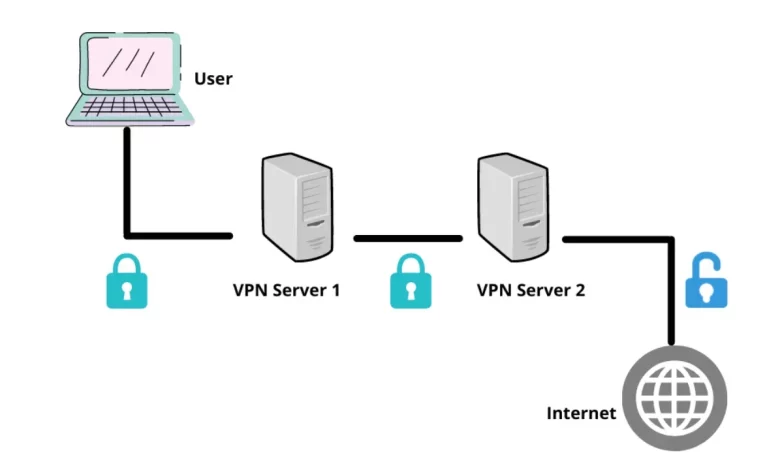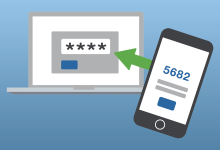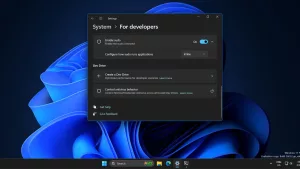
Maintaining online security and privacy has become a top priority for internet users today. Virtual Private Networks (VPNs) have emerged as essential tools to safeguard personal data and protect users’ identities while browsing the web. One such advanced feature offered by premium VPN providers is the “Double-Hop” feature. This article will delve into what a VPN double-hop feature is, how it works, and its benefits in enhancing online security and anonymity.
1. What is a VPN?
A VPN, or Virtual Private Network, is a secure and encrypted network connection that allows users to browse the internet anonymously by routing their traffic through remote servers located in various regions. It encrypts users’ data, making it difficult for hackers, ISPs, and other prying eyes to intercept or monitor online activities.
2. Understanding the Double-Hop Feature
The Double-Hop feature, also known as “Multi-Hop” or “Cascade,” takes the concept of VPN protection to the next level. While a traditional VPN connection routes the user’s internet traffic through a single server, a double-hop VPN adds an extra layer of security by redirecting the data through two separate VPN servers.
3. How Does Double-Hop Work?
3.1. VPN Server Chains
In a double-hop setup, the user’s data travels through a chain of VPN servers before reaching its final destination. This multi-hop pathway helps in obfuscating the user’s original IP address and location, making it harder for anyone to trace back their online activities.
3.2. Encryption Layers
Each VPN server in the double-hop chain encrypts and decrypts the data passing through it. This double encryption ensures that even if someone manages to intercept the data, they will only see a garbled mess, adding an extra layer of security to the user’s online communications.
4. Advantages of Double-Hop Feature
4.1. Enhanced Privacy
With two VPN servers involved, the user’s online traffic is significantly harder to track or monitor. This feature is especially beneficial for individuals who prioritize their privacy and want to avoid any potential surveillance.
4.2. Mitigation of Traffic Analysis
Double-hop VPNs make traffic analysis attacks more difficult, as the data is split and sent through different routes, making it challenging for anyone to piece together the complete browsing history of a user.
4.3. Bypassing Geo-Restrictions
The double-hop feature allows users to access geo-restricted content by virtually changing their location twice, granting them access to websites and services that might otherwise be blocked in their region.
4.4. Protection Against Man-in-the-Middle Attacks
By encrypting data twice and sending it through different servers, double-hop VPNs protect users from man-in-the-middle attacks, ensuring their sensitive information remains secure.
5. Choosing the Right VPN with Double-Hop
When selecting a VPN with the double-hop feature, several factors need to be considered:
5.1. Server Locations
Ensure the VPN provider has servers in the countries you want to connect to for double-hop functionality.
5.2. Speed and Performance
Evaluate the speed and performance of the double-hop feature to ensure it meets your online activities’ requirements.
Promoted contents:
5.3. Logging Policies
Opt for VPN providers with strict no-logs policies to ensure your online activities are not recorded or stored.
5.4. Customer Support
Choose a VPN provider with reliable customer support to assist you with any issues or questions regarding the double-hop feature.
6. Potential Drawbacks of Double-Hop
While the double-hop feature offers enhanced security, there are some drawbacks to consider:
- Reduced Speed: Since the data is routed through two VPN servers, there might be a slight reduction in internet speed.
- Increased Subscription Cost: Double-hop VPNs typically cost more than regular VPN services due to the infrastructure required for the multi-hop setup.
Recommended VPNS with double-hop feature
- NordVPN – $3.49 per month (with this 66% off coupon); based in Panama; 31 double VPN configurations
- Surfshark – $3.49 per month; based in The Netherlands; 15 double-VPN server configurations
- ProtonVPN – $8.00 per month; based in Switzerland; 48 double VPN servers
- VPN.ac – $3.75 per month; based in Romania; 22 double VPN configurations
Conclusion
In conclusion, the VPN double-hop feature is a powerful tool that adds an extra layer of security and privacy to your online activities. By redirecting your data through two VPN servers, it becomes significantly more challenging for anyone to track or intercept your online communications. However, it’s essential to weigh the benefits against the potential drawbacks, such as reduced speed and increased cost, to determine if a double-hop VPN is the right choice for your online protection needs.
Frequently Asked Questions (FAQs)
8.1. What is the difference between single-hop and double-hop VPNs?
A single-hop VPN routes your traffic through one server, while a double-hop VPN routes it through two servers, adding an extra layer of security and anonymity.
8.2. Can I use any VPN for the double-hop feature?
Not all VPN providers offer the double-hop feature. Make sure to choose a reputable VPN service that specifically advertises this functionality.
8.3. Is the double-hop feature legal?
Yes, using a double-hop VPN is legal in most countries. However, always ensure you comply with the local laws and regulations regarding VPN usage.
8.4. Will using double-hop affect streaming and gaming performance?
Using a double-hop VPN may lead to slightly reduced internet speed, which can impact streaming and gaming performance. Choose a VPN provider with high-speed servers for better performance.
8.5. How can I test if my double-hop VPN is working?
You can use various online tools to check your IP address and confirm if your double-hop VPN is successfully hiding your real location and IP.
8.6. How is VPN double-hop different from double vpn?
VPN Double-Hop and Double VPN are both techniques used to enhance online security and anonymity by adding extra layers of protection. However, they differ in how they achieve this goal.
- VPN Double-Hop:
- VPN Double-Hop, also known as Multi-Hop or Cascade, involves routing your internet traffic through two different VPN servers consecutively.
- When you use a VPN with a double-hop feature, your data is first encrypted and sent to the first VPN server. From there, it is encrypted again and forwarded to a second VPN server before reaching its final destination on the internet.
- The purpose of this setup is to obfuscate your original IP address and add an additional layer of security to your online communications. It makes it significantly more challenging for anyone to trace or monitor your online activities since your data takes a longer and more complex route through multiple servers.
- Double VPN:
- Double VPN, also known as Dual VPN or VPN Chain, involves chaining multiple VPN servers together to create a series of encrypted tunnels.
- With Double VPN, your internet traffic is first encrypted and sent to the first VPN server. Instead of stopping there like in a regular VPN connection, it is then encrypted again and passed through a second VPN server before finally reaching the internet.
- The purpose of Double VPN is similar to VPN Double-Hop: to add an extra layer of encryption and anonymity to your online activities. It creates an additional barrier against potential eavesdroppers, as your data passes through two separate layers of encryption.
In summary, VPN Double-Hop and Double VPN both add extra layers of security to your online traffic by routing it through multiple VPN servers. The main difference lies in how they achieve this setup. VPN Double-Hop sends your data through two servers consecutively, while Double VPN creates a chain of multiple VPN servers, encrypting your data at each step of the way. Both techniques are effective in enhancing online security and privacy, but their implementation may vary depending on the VPN service provider you choose.








